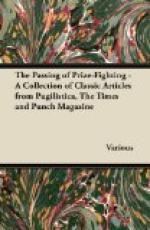it as correct, and evidently feel increased respect
for
Rubens as capable-for an artist—of
driving a good bargain. “
Rubens baint
him ven he vas seexteen,” which younger Briton
considers “very
creditable to him, too!”
They inspect the High Altar, with more clucks, and
inform one another, with the air of Protestants who
are above prejudice, that it’s a marvellous
piece o’
work, though, mind yer!
Sacristan points out holes underneath choir-stalls.
“De organ is blay over dere, and de mooshique
he com out hier troo de ’oles, so all be beoples
vas vender vere de schounds com from!” First
Briton remarks to me that “That’s a rum
start, and no mistake.” I agree that it
is a rum start. I shall find myself clucking
presently, I know! “Haf you scheen yed
de bortraits of GLATSHTONE and Lort BAGONSFELDT?”
Sacristan asks us “... ‘No?’
then I show you.” He leads us up to the
finial of one of the stalls, which is carved in the
figure of a monk. “Is not dat de Ole Grandt
Man himself?” he asks, triumphantly. Second
Briton agrees “It’s a wonderful likeness,
reelly.” His Companion admits “They’ve
got old GLADSTONE there to a
t”—but
adds that “come to
that, it might do
for
either of ’em.” “Lort
BAGONSFELDT” is opposite, but, as Sacristan
observes, would be more like “if dey only vas
gif him a leedle gurl on de vorehead.” Next
we are taken to the Retro-Choir and shown the “mosh
gurious and peautiful bainting in de ole Cathedrale.
Schtand yust hier, Gentelmens,
now you see him.
Beoples say, ’Oh, yais,
ve know, yust
a marble-garvings—a baw releff!’
I dell you, nodings of de kindt. All so flat as
a biece of vite baper—com close op.
Vat you tink? Vonderful, hey?” Britons
deeply impressed by this and other wonders, and inform
Sacristan that their own Cathedrals “ain’t
in it.” “Look at the
value
of the things they’ve
got ’ere,
you know,” they say to me, clucking, and then
depart, after asking Sacristan the nearest way to the
Zoo.
At Table d’hote.—Fellow-countrymen
to the fore; both my immediate neighbours English,
but neither shows any inclination to converse.
Rather glad of it; afternoon of Museums and Galleries
instructive—but exhausting. Usual
Chatty Clergyman at end of table, talking Guide-book
intelligently; wife next him, ruminating in silence
and dismally contemplating artificial plant in a plated
pot in front of her. It is a depressing
object—but why look at it? Horror of
two Sportsmen opposite on being offered snipe.
“Snipe now—Great Scott!”
they exclaim, “And ain’t they high
too?” One helps himself to some, with a sense
that being on the Continent makes all the difference.
But even his courage fails on being offered
stewed apricots with it. Close by a couple of
Americans; a dry middle-aged man, and a talkative young
fellow who informs him he was at Harvard. Elder
man listens to him with a grim and wooden forbearance.




